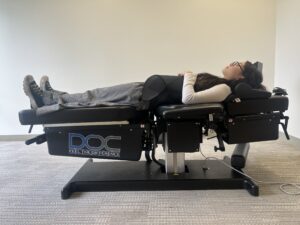Understanding Neuropathy

Neuropathy Treatment in San Francisco
Neuropathy is a condition that occurs when the peripheral nerves, outside of the brain and spinal cord, are damaged, causing weakness, numbness, and pain. It encompasses various types, including carpal tunnel syndrome and diabetic neuropathy. Neuropathy can have several causes, such as traumatic injuries, infections, metabolic problems, inherited disorders, and exposure to toxins. TruSpine, a chiropractic office located in San Francisco, specializes in providing chiropractic care and therapies to address neuropathy-related concerns.
Neuropathy is a condition that affects the peripheral nerves, which are responsible for transmitting messages to and from the brain and spinal cord. When these nerves become damaged or diseased, it can lead to a variety of symptoms, including pain, numbness, and weakness. Carpal tunnel syndrome and diabetic neuropathy are two common types of neuropathy. Carpal tunnel syndrome occurs when the median nerve in the wrist becomes compressed, leading to symptoms such as tingling and numbness in the hand. Diabetic neuropathy, on the other hand, is a type of neuropathy that occurs in people with diabetes and is caused by high blood sugar levels damaging the nerves.
There are two main types of neuropathy: mononeuropathy and polyneuropathy. Mononeuropathy occurs when a single peripheral nerve is damaged, often due to physical injury or trauma. For example, a person may develop mononeuropathy after a car accident where they injure a specific nerve in their arm. Polyneuropathy, on the other hand, involves the malfunctioning of multiple peripheral nerves simultaneously and can have various causes. Alcohol abuse and diabetes are common causes of polyneuropathy.
Common Causes of Neuropathy
- Diabetes: One of the most common causes of neuropathy is diabetes. High blood sugar levels can damage the nerves, leading to neuropathy. It is essential for individuals with diabetes to manage their blood sugar levels effectively to prevent or control neuropathy. For example, monitoring blood sugar levels regularly, following a balanced diet, and taking prescribed medications can help prevent nerve damage.
- Trauma or Injury: Physical injuries, such as accidents or falls, can result in nerve damage and neuropathy. It is crucial to take precautions to prevent injuries and seek medical attention if an injury occurs. For example, wearing protective gear while participating in sports or using handrails while going down stairs can help reduce the risk of injury.
- Infections: Certain infections, including viral or bacterial infections, can cause neuropathy. Examples include Lyme disease, shingles, and HIV-related neuropathy. Proper treatment of the underlying infection is necessary to address neuropathy symptoms. For instance, taking antibiotics to treat a bacterial infection or antiviral medications to manage viral infections can help prevent or alleviate neuropathy symptoms.
- Autoimmune Diseases: Some autoimmune diseases, such as rheumatoid arthritis or lupus, can lead to nerve damage and neuropathy. The immune system mistakenly attacks the body’s own tissues, including nerves, causing damage. Managing the autoimmune condition is crucial in managing neuropathy symptoms. This may involve taking immunosuppressant medications or undergoing treatments to reduce inflammation.
- Vitamin Deficiencies: Lack of certain vitamins, such as B vitamins or vitamin E, can contribute to neuropathy. A balanced diet that includes foods rich in these vitamins is essential for nerve health. For example, consuming foods like leafy green vegetables, nuts, and whole grains can help ensure an adequate intake of B vitamins.
- Medications: Certain medications, including chemotherapy drugs or antiretroviral drugs, can cause neuropathy as a side effect. If you are taking any medication and experience neuropathy symptoms, it is important to consult your healthcare provider. They may be able to adjust your medication or prescribe additional treatments to help manage the neuropathy symptoms.
- Alcohol Abuse: Excessive alcohol consumption can damage nerves and result in neuropathy. Limiting alcohol intake or seeking help for alcohol addiction can help prevent or manage neuropathy.
- Kidney or Liver Diseases: Conditions affecting the kidneys or liver, such as chronic kidney disease or liver cirrhosis, can cause neuropathy. Proper management of these conditions is essential in preventing further nerve damage. This may involve medications, lifestyle changes, or medical procedures to improve the function of the kidneys or liver.
- Genetic Disorders: Some genetic conditions, like Charcot-Marie-Tooth disease type 1, can result in neuropathy. These disorders are inherited and require specialized medical care for management. Genetic testing can help identify these conditions and guide treatment decisions.
It is important to note that these are just some of the common causes of neuropathy, and there may be other factors involved in individual cases. If you are experiencing symptoms of neuropathy, it is crucial to consult with a healthcare professional for a proper diagnosis and appropriate treatment.
Additional reading: Nerve Pain: Your Body’s Alarm System
Top Neuropathy Treatment in San Francisco
At TruSpine, we’re dedicated to your well-being. If you or a loved one are dealing with neuropathy, understanding its root causes is the first step towards effective treatment and relief. Our expert team in San Francisco, CA, is here to provide the support and specialized care you need. Don’t let neuropathy hold you back any longer – reach out to us today to schedule a consultation. Together, we can uncover the causes and work towards a pain-free, more comfortable future. Your path to neuropathy relief begins at TruSpine, and we’re ready to guide you every step of the way.
Truspine
150 Lombard St Ste 2, San Francisco, CA 94111
(415) 421-1115



